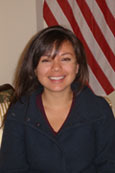
With memories of dorm life and final exams still fresh in her mind, Sarah Burch is already starting to feel right at home on Capitol Hill.
Burch lived in Washington, D.C., between her junior and senior years at Notre Dame, spending the summer working in the office of Sen. Maria Cantwell. Initially an intern to the legislative assistant responsible for foreign affairs, she was quickly promoted to executive assistant to Cantwell's chief of staff.
This experience, Burch says, coupled with that she gained last spring as a political science major writing her senior thesis, left her "well-prepared to hit the ground running" at the United States Commission on International Religious Freedom (USCIRF) several months after graduation.
"My day can range from engaging with different congressional offices on international religious freedom and human rights issues to attending hearings and testimonies on Capitol Hill to working on various campaigns that the commission focuses on," says Burch, the group's governmental relations intern since September. She also drafts memorandums, summarizes policy focuses, edits legislative language, and edits hearing testimonies of [USCIRF] commissioners who are going to testify before Congress.
Established by the International Religious Freedom Act of 1998, the USCIRF monitors the status of freedom of thought, conscience, and religion/belief abroad and gives independent policy recommendations to the president, secretary of state, and Congress. Given her research interests, such a mission couldn't suit Burch any better.
For her thesis—"Women, Headscarves, and Universities: The Wearfare in Turkey"—she used a grant from Notre Dame's Undergraduate Research Opportunity Program to travel to that country. While there, she polled 65 female university students and conducted in-depth interviews with 25 of them about a law that prohibits women from wearing the Muslim headscarf on campuses and in government buildings.
Burch found that the majority of those she surveyed support lifting the ban, as they believe wearing the headscarf is a personal choice that shouldn't impact their access to education.
However, she says it's politicians and academics who dominate discourse on the topic.
"My studies and my paper were designed to provide a medium of agency for the unheard voices of university-attending women; it was an attempt to convey what these women had to say about their experiences," says Burch, who minored in peace studies and Mediterranean/Middle East studies at Notre Dame. "I ultimately hoped to contribute new research and knowledge on this issue and present the perspectives of the women who are directly affected by the headscarf ban."